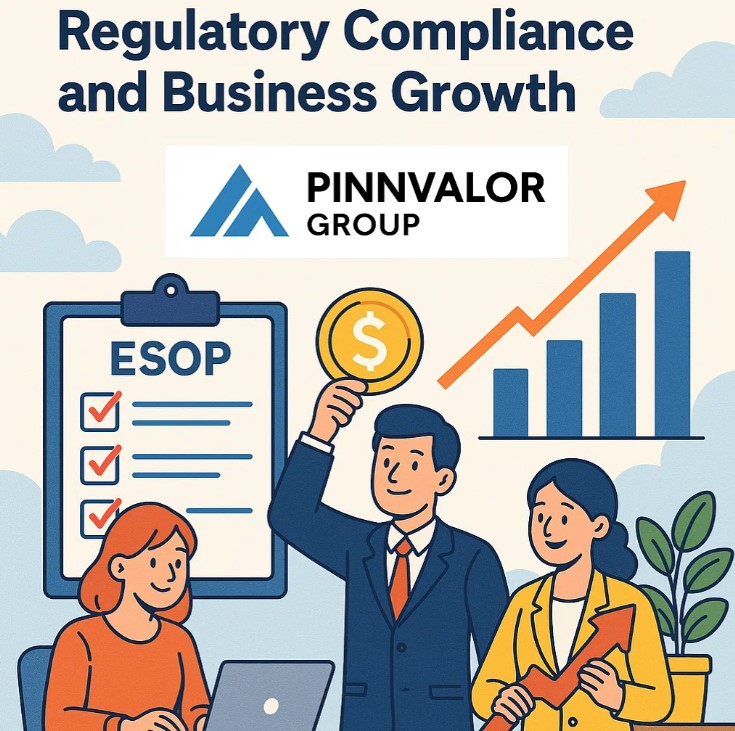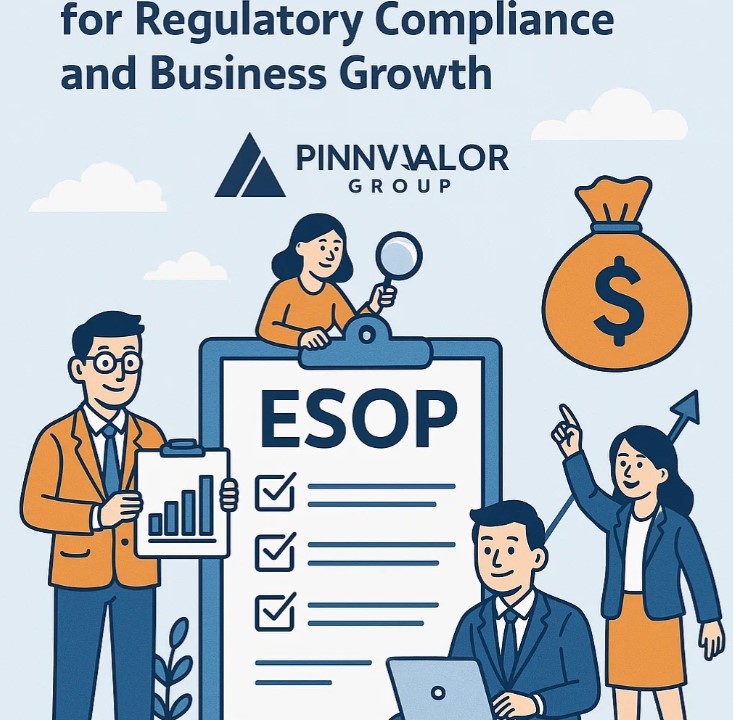
Comprehensive Guide to Valuation of ESOPs for Regulatory Compliance and Business Growth
Employee Stock Ownership Plans (ESOPs) have become a powerful tool for startups and established companies alike to attract, retain, and motivate talent. Offering employees ownership stakes aligns their interests with the company’s long-term success. However, issuing ESOPs comes with significant regulatory and financial considerations, especially around the valuation of shares.
In this blog, we will explore the essentials of ESOP valuation, why it’s critical for regulatory compliance, and how an accurate valuation can fuel sustainable business growth.
Are you maximizing the true potential of your ESOPs through accurate and compliant valuation?
Accurate ESOP valuation is not just a regulatory necessity—it’s a strategic advantage that fuels business growth and employee loyalty.
What Are ESOPs and Why Are They Important?
ESOPs are employee benefit plans that grant employees shares or stock options in the company. They serve multiple purposes:
- Talent retention and motivation: Giving employees a stake in the company encourages long-term commitment.
- Aligning interests: Employees become co-owners and work towards company success.
- Cash flow benefits: ESOPs can be a cost-effective way to compensate employees without immediate cash outflow.
However, the value of these shares must be carefully determined to ensure fairness, compliance, and transparency.
The Importance of ESOP Valuation
Regulatory Compliance
Companies must comply with various regulations around ESOPs, which typically require:
- Fair market value (FMV) assessment: To set exercise prices for stock options or to report share values.
- Tax compliance: Correct valuation affects employee tax liabilities and company tax benefits.
- Accounting standards: Accurate valuation is necessary for financial reporting, especially under IFRS and US GAAP.
- Securities regulations: Proper disclosures and filings depend on correct valuation.
Non-compliance or inaccurate valuations can result in penalties, legal challenges, or loss of employee trust.
Business Strategy and Growth
Accurate valuation isn’t just a regulatory checkbox; it plays a key role in strategic decision-making:
- Setting competitive ESOP prices: Ensures attractiveness without diluting existing shareholder value.
- Attracting investors: Transparent valuation builds investor confidence.
- Mergers & acquisitions: Proper share valuation helps in negotiations.
- Employee morale: Fair pricing boosts motivation and retention.
Common Methods of ESOP Valuation
Several valuation methodologies are used depending on the company’s size, stage, and industry:
1. Discounted Cash Flow (DCF) Method
- Projects future cash flows and discounts them to present value.
- Suitable for companies with stable cash flow projections.
- Pros: Reflects intrinsic value based on fundamentals.
- Cons: Sensitive to assumptions; complex for startups.
2. Market Approach
- Compares company valuation multiples to those of similar companies.
- Common multiples include EV/EBITDA, P/E ratios.
- Pros: Market-driven, easy to benchmark.
- Cons: Difficult for private companies or unique business models.
3. Asset-Based Valuation
- Calculates net asset value by subtracting liabilities from assets.
- Often used for companies with substantial tangible assets.
- Pros: Straightforward.
- Cons: Ignores future earnings potential.
4. Option Pricing Models (Black-Scholes or Binomial Models)
- Used specifically for valuing stock options.
- Considers exercise price, volatility, time to expiry, etc.
- Pros: Widely accepted for option valuation.
- Cons: Requires detailed inputs; can be complex.

Regulatory Framework Governing ESOP Valuation
Depending on the jurisdiction, several regulations govern ESOP valuation. For example:
In India
- Companies Act, 2013: Requires independent valuation for ESOP pricing.
- Securities and Exchange Board of India (SEBI): Guidelines for listed companies.
- Income Tax Act: Prescribes valuation for tax purposes, typically FMV determined by a registered valuer.
In the United States
- Internal Revenue Service (IRS) rules require ESOP valuations for tax compliance.
- Financial Accounting Standards Board (FASB) guidelines for accounting treatment.
Companies must stay updated with evolving laws to ensure compliance.
Best Practices for ESOP Valuation
- Engage Independent Valuers: Ensure unbiased, expert valuation for credibility.
- Periodic Valuations: Regular updates reflect changing business realities.
- Document Assumptions: Transparency in methodology builds trust.
- Align Valuation with Business Goals: Balance employee benefits and shareholder value.
- Integrate with Legal and Tax Advisors: Ensure holistic compliance.
Conclusion
Valuation of ESOPs is a critical process that impacts regulatory compliance, employee satisfaction, and overall business growth. Companies that invest in accurate, transparent valuation methods gain a competitive edge, foster trust among stakeholders, and create a strong foundation for sustainable success.
By understanding the nuances of ESOP valuation and adhering to best practices and regulatory requirements, businesses can unlock the full potential of their employee ownership plans.
If you found this guide helpful or want assistance with ESOP valuation strategies tailored to your business, feel free to reach out!
